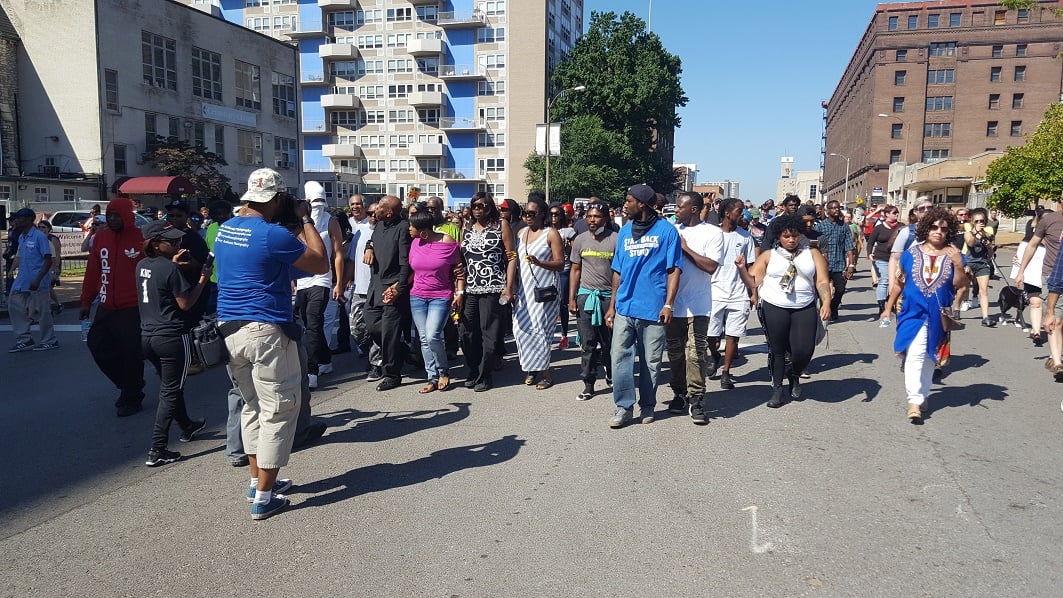ST. LOUIS (CN) --- Courthouse News joined 28 other media organizations in filing a brief supporting journalist Michael Faulk in his lawsuit against members of the St. Louis Police Department over his arrest while covering protests in response to an officer's acquittal in the killing of a Black motorist.
Faulk, an award-winning reporter for the St. Louis Post-Dispatch, was covering the protests stemming from the Jason Stockley trial in September 2017 when he was among more than 100 people arrested as police employed a controversial “kettling” technique.
Kettling is a police tactic used for controlling large crowds in which officers surround a group of protesters before arresting them. It is controversial because it sometimes results in the arrest of ordinary bystanders along with protesters.
The amicus brief, filed by the Reporters Committee for Freedom of the Press and 29 media organizations late Friday before the Fourth of July holiday weekend, claims the coalition has a strong interest in the “proper and robust application of First Amendment protections” for reporters covering protests.
“Rigorous protection for the newsgathering rights of journalists covering protests is not only compelled by the First Amendment, it is essential if the press is to fulfill its constitutionally recognized function of holding the government accountable to the governed,” the brief states.
Stockley, a white former cop, was charged with first-degree murder in the shooting death of Black motorist Anthony Lamar Smith following a high-speed chase in December 2011.
According to a probable cause statement, Stockley was heard on the police radio during the chase saying he was “going to kill this motherfucker, don't you know it.” He fired five shots into Smith moments later.
His acquittal by a St. Louis judge on Sept. 15, 2017, prompted hundreds to take to the St. Louis streets. The protests, which turned violent, lasted for months and included the incident involving Faulk two days after the verdict.
Faulk’s lawsuit says he was on assignment covering the protest, using his bicycle and wearing his press credentials when police used the kettling tactic to round up the protesters. Faulk claims officers pushed him down and held him by putting a boot to his head and sprayed him in the face with pepper spray after his wrists were bound with zip ties.
He was issued a summons for failure to disperse and released on $50 bail after being held for 13 hours in a city police department jail.
In November 2017, a federal judge in another lawsuit related to the protests issued an injunction prohibiting city police from using the kettling technique during protests.
Faulk sued the officers involved in federal court, alleging violations of his rights under the First, Fourth and 14th Amendments. A motion to dismiss on the basis of qualified immunity was rejected, prompting the officers' appeal to the Eighth Circuit, where the brief supporting Faulk was filed.
“When law enforcement subjects journalists engaged in lawful newsgathering to kettling, the use of force, or arrest—particularly, as here, when they claim to be effectuating a general dispersal order—they not only violate important First Amendment protections … they also deprive the public of essential reporting on how law enforcement itself responds to protest activity,” the brief states. “Such conduct is thus a particularly cute threat to First Amendment first principles and an informed electorate.”
The brief says Faulk has clearly shown there was no probable cause for an arrest.
The amicus filing also attacks the officers’ claim that Faulk was part of a “unit” of protesters.
“Again, appellee offers significant support for the proposition that there was no ‘unit’ of protesters engaged in unlawful activity at the time of the kettle,” the brief states. “But, even if there were, a journalist, clearly identifiable as such and engaged in lawful newsgathering, cannot be part of that ‘unit.’ Were that the case, law enforcement would always have grounds to detain or arrest journalists covering the dispersal of an assembly, who necessarily must be near the activity to do their job.”
The brief argues that reporters cannot safely cover protests if their mere presence provides grounds for police to arrest or assault them and that a journalist’s presence at an unlawful assembly cannot support probable cause that they are a participant.
The press coalition further argues it is unconstitutional to hold a journalist who observes and reports illegal activity liable for not intervening. The brief points out that Faulk was not the only journalist arrested during the kettling roundup.
“Adopting the construction urged by appellant would permit many more such arrests—including those of journalists who are simply doing their job and reporting on wrongdoing by others—heightening the risk of chill, and arbitrary or retaliatory enforcement of the unlawful assembly ordinance,” the brief states. “It would physically endanger reporters. And it would flip a core First Amendment principle—that punishment for any unlawful activity apply to the lawbreaker—on its head.”
Subscribe to Closing Arguments
Sign up for new weekly newsletter Closing Arguments to get the latest about ongoing trials, major litigation and hot cases and rulings in courthouses around the U.S. and the world.








